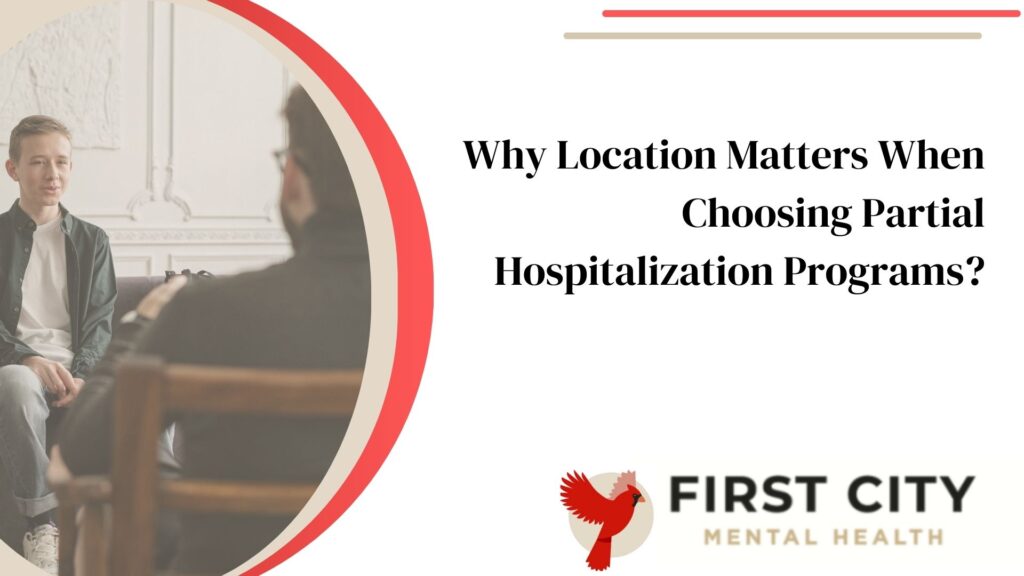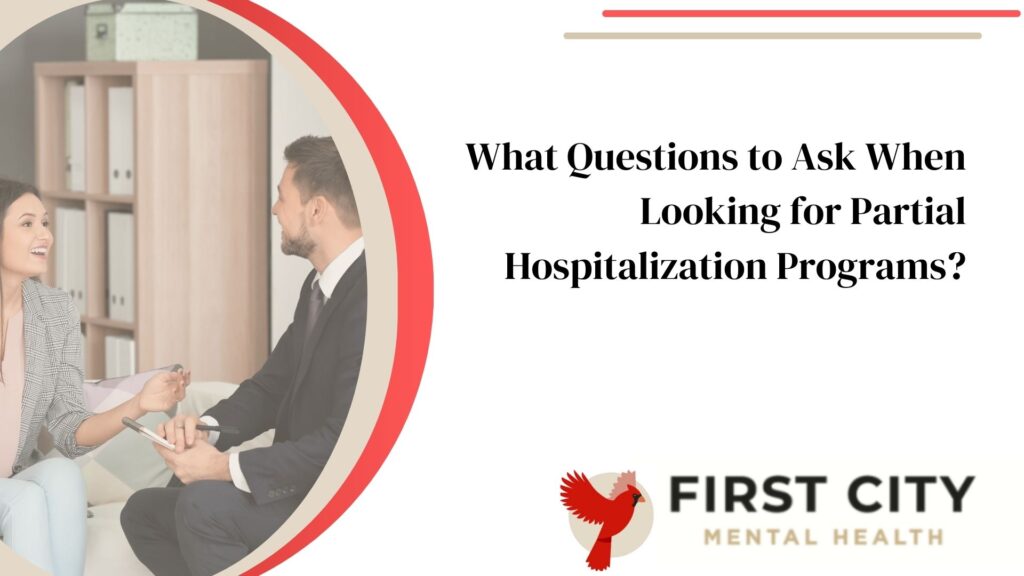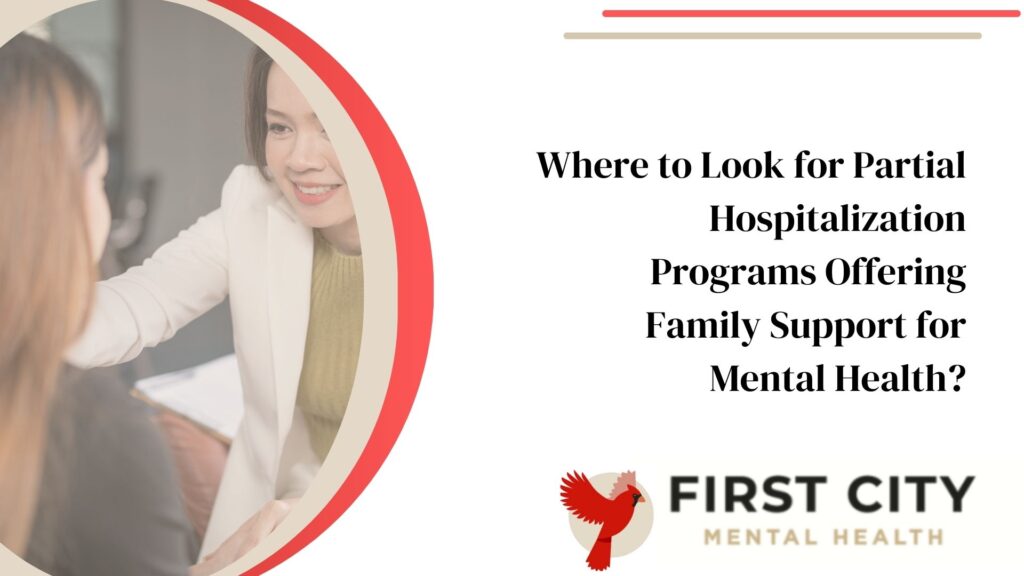
What Role Do Partial Hospitalization Programs Play in Relapse Prevention?
January 27, 2025
What Are the Differences Between Partial Hospitalization Program and Intensive Outpatient Program?
January 27, 2025Finding the proper mental health care can be challenging, especially if you’re seeking a program that offers more intensive treatment without requiring an overnight stay. Many people struggle to identify quality partial hospitalization program (PHP) that cater to their unique needs and help stabilize their mental health effectively.
Partial hospitalization programs are structured, intensive outpatient mental health treatment programs designed to offer comprehensive daily support, including group therapy and medication management, while allowing patients to live at home. These programs bridge the gap between inpatient hospitalization and outpatient care, making them ideal for those who need structured support but wish to maintain independence.
You’ll learn how location impacts your choice, key questions to ask providers, and tips on comparing different options.
Discover where you can find reputable PHPs with comprehensive services and why family support is crucial in these programs.
Key Takeaways
- To ensure structured support, look for PHPs offering 6-8 hours of daily therapy, life skills training, and medication management.
- Choose programs with licensed professionals like therapists and psychiatrists who provide specialized care tailored to individual needs.
- Consider facilities that accept various insurance plans to reduce out-of-pocket costs while receiving quality mental health care.
What Criteria Define Quality in Mental Health Treatment Partial Hospitalization Programs?
Quality partial hospitalization Kokomo programs (PHP) offer a structured, intensive outpatient treatment program for individuals with serious mental health conditions. Here’s what defines a top-notch PHP program:
Duration: Typically lasts 30-45 days. This timeframe allows adequate time for patients to stabilize and work towards reintegrating into society.
Comprehensive Services: This includes group and individual therapy, medication management, daily chef-prepared meals, life skills training, psychiatric evaluations, and aftercare planning.
Length of Daily Programming: It involves 6-8 hours of daily programming, including intensive therapies and skill-building activities, to help patients manage their mental health more effectively.
Qualified Staff: Program staff should include licensed mental health professionals such as psychiatrists, therapists, and nurses who can provide specialized care tailored to each patient’s needs.
Aftercare Planning: Essential components like addiction case management and aftercare services ensure that patients receive support after completing the program.
24-Hour Nursing Care: This facility offers around-the-clock nursing care to address any medical needs and ensure safety during the treatment process.
Genesight Testing: This program utilizes Genesight testing for personalized medication management, ensuring that treatments are effective based on each patient’s genetic makeup.
Family Support Services: Offers family therapy sessions and resources to involve loved ones in the recovery process and foster a supportive environment at home.
Insurance Coverage Options: It accepts various insurance plans, which can significantly reduce out-of-pocket costs for patients and families seeking treatment.
Individualized Treatment Plans: Develop personalized treatment goals based on thorough assessments of each patient’s symptoms and specific needs, ensuring targeted care.
Multiple Modalities of Therapy: Incorporates different types of therapy, such as dialectical behavioral therapy (D.B.T.), to address various mental health concerns.
Structure Without Overnight Stay: This option provides a structured environment with intensive support while allowing patients to return home every evening, which can be crucial for those with family or work commitments.
Life Skills Reintegration: Focuses on teaching essential life skills that enable individuals to manage daily functioning independently post-treatment day, excluding holidays during their stay in the program.
Holistic Approach: This approach addresses all aspects of health, including physical well-being, through activities like nutrition counseling alongside traditional mental health treatments.
Why Location Matters When Choosing Partial Hospitalization Programs?

Location directly impacts the success of a mental health Partial Hospitalization Program (PHP). Patients benefit from residing in community or sober housing off-site. This setting allows them to reintegrate into society effectively, which is crucial for mental health stabilization and independent living.
Ensuring easy access to treatment without requiring an overnight stay helps maintain consistency in their daily routines, including attending school or working.
Accessible PHPs make group therapy, individual counseling, medication management, and life skills training more available. Proximity to these services ensures patients can regularly participate in programs tailored to their needs.
How to Identify Reputable Partial Hospitalization Programs?
Proximity is vital, but so is the quality of care. To identify reputable partial hospitalization program mental health (PHP), prioritize centers offering a comprehensive treatment approach.
Look for PHPs providing group and individual therapy, medication management, and aftercare planning. Quality programs should also include medical and psychiatric support and addiction case management.
Check the credentials of their treatment team. Ensure they have qualified professionals like licensed therapists and board-certified psychiatrists on staff. Investigate if the program includes nutritional counseling as part of its service offerings; this indicates a holistic approach to patient well-being.
Lastly, reviews or testimonials from former patients should be read to gauge satisfaction with the program’s effectiveness in stabilizing mental health conditions.
What Questions to Ask When Looking for Partial Hospitalization Programs?

When searching for a partial hospitalization program PHP, the right questions can help you find the best fit. Here are vital questions to consider:
- What is the typical duration of the program?
- It is crucial to understand how long you or your loved one will need to attend. Most programs last from a few weeks to several months.
- What level of care does the program offer compared to other treatment options?
- Determine if the program provides intensive care that aligns with your needs, such as mental health partial hospitalization programs.
- What types of therapy and support are included in the program?
- See details on individual therapy, group therapy, and specialized support like family counseling.
- What is the overall goal of the program for individuals participating?
- Ensure that goals align with personal recovery needs, whether it’s substance abuse treatment, psychiatric stabilization, or life skills training.
- How many hours a day does the therapeutic programming involve?
- Programs often run six to eight hours daily; verify this matches your availability and schedule.
- What specific types of therapy and support are provided?
- Confirm if they offer cognitive-behavioral therapy (C.B.T.), dialectical behavior therapy (D.B.T.), or other evidence-based treatments.
- What is the program’s focus on medication management and life skills reintegration?
- Check their approach toward managing medications and teaching essential daily living skills for better reintegration into society.
- Does the program accept insurance or require out-of-pocket costs?
- Investigate financial aspects, including whether they work with your insurance company or have significant out-of-pocket expenses.
- How do they handle referrals and intake processes?
- Learn about their referral process to understand how doctors or mental health professionals refer patients to the program.
- Is there any family support offered within this partial hospitalization program php?
- Family involvement can be vital; check if they offer sessions focusing on involving family members in treatment plans.
- Can individuals attend school or work while participating in this adult partial hospitalization program?
- Assess whether their schedule allows for attending school or maintaining employment alongside treatment.
How to Compare Different Partial Hospitalization Programs?
When choosing an Indiana Partial Hospitalization Program (PHP), comparing different options is crucial to finding the best fit for your needs. Here’s a detailed comparison guide presented in an HTML table format:
Criteria Details
Duration 30-45 days: This provides a structured timeframe for recovery, which is crucial for transitioning from residential to outpatient care.
Program Intensity: 6-8 hours of therapeutic programming daily ensures comprehensive care through individual and group therapy sessions.
Therapeutic Services: Group therapy, individual therapy, medication management. Addresses various aspects of mental health and addiction, offering holistic support.
Living arrangements: Allow patients to live at home and Facilitate reintegration into daily life while providing intensive support.
Additional Services: 24-hour nursing care, aftercare planning, addiction case management, and nutritional counseling offer comprehensive care and prepare patients for long-term recovery.
Life Skills Training: Focuses on reintegrating life skills and independent living. It prepares individuals for everyday challenges, promoting a smoother transition to independence.
Family Support: Family therapy and support services involve the family in recovery, enhancing the patient’s support system.
Where to Find Partial Hospitalization Programs with Comprehensive Services?
Comparing different partial hospitalization program PHP leads us to seek those that offer comprehensive services. Look for facilities that provide daily medical and psychiatric care, as these are crucial in stabilizing mental health conditions.
Many quality programs include group therapy, individual therapy, medication management, and life skills training within a structured schedule of 6-8 hours a day.
Indiana has several reputable partial hospitalization programs known for their extensive services. Facilities in Kokomo are particularly noted for their intensive care approach, designed to meet individual needs without requiring an overnight stay.
These programs often incorporate aftercare planning and addiction case management, ensuring patients receive continuous support after completing the program.
What Makes a Partial Hospitalization Program Stand Out?
Finding adult partial hospitalization program with comprehensive services is a crucial step. Understanding what sets these programs apart can help you make the best choice.
Partial hospitalization programs offer extensive therapeutic programming, typically involving 6-8 hours of individual and group therapy sessions daily. This intensive schedule provides patients with the structure and support needed to stabilize their mental health.
A standout program will also include robust aftercare planning, ensuring patients have ongoing support once they transition back to everyday life. This includes identifying a solid support system and scheduling follow-up therapy appointments.
High-quality partial hospitalization programs provide personalized treatment plans tailored to each patient’s needs and goals. These individualized plans incorporate specific interventions like medication management, education on coping strategies, and other activities designed to promote recovery and independent living skills.
Comprehensive services ensure patients receive well-rounded care addressing every aspect of their mental health during their stay in the program.
Where to Look for Partial Hospitalization Programs Offering Family Support for Mental Health?

Seek a partial hospitalization program in Indiana offering family support at specialized mental health facilities. These locations often understand the crucial role of family in recovery and provide comprehensive services to include them.
In Kokomo, Indiana, several centers offer robust treatment plans that integrate family therapy sessions and education.
Contact local hospitals or clinics in Indiana that focus on mental health for recommendations. Many such programs ensure that aftercare planning involves identifying support systems and scheduling ongoing therapy appointments.
Additionally, online directories like Psychology Today list reputable options for partial hospitalization program mental health treatments with a strong emphasis on family involvement.
Conclusion
Consider the essential aspects of a quality partial hospitalization program. Ensure it offers comprehensive care, including therapy and life skills training. Ask about family support services and aftercare planning.
Compare different options to find one that best meets your needs. Look for programs with positive reviews and experienced staff. Choose facilities that focus on helping you successfully reintegrate into daily life.
FAQs
What is a partial hospitalization program in Indiana?
A partial hospitalization program in Indiana offers treatment without needing to stay overnight. It includes psychiatry and other therapies.
How can I find quality partial hospitalization programs in Kokomo?
Look for programs that meet certain requirements, have good reviews, and are recommended by doctors who regularly refer patients.
Are there out-of-pocket costs for these treatment programs?
Yes, depending on your insurance coverage and the specific services provided, some partial hospitalization programs may have out-of-pocket costs.
Is a partial hospitalization program a good alternative to full-time inpatient care?
Yes, it serves as an alternative for those who need intensive treatment but do not require staying overnight at the facility.






